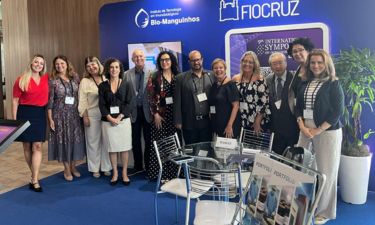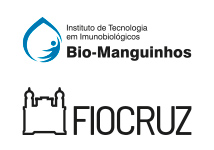 The Global Vaccine and Immunization Research Forum (GVIRF) 2025, one of the leading international events focused on vaccine research, development, and innovation, was held in Rio de Janeiro from March 25th to 27th, with support from Bio-Manguinhos/Fiocruz. The forum was co-organized by the WHO and the Gates Foundation, with the Institute participating in various roles, particularly on the Scientific Organizing Committee. Scientific advisor Marcos Freire contributed to shaping the agenda on arboviruses and gave talks throughout the event.
The Global Vaccine and Immunization Research Forum (GVIRF) 2025, one of the leading international events focused on vaccine research, development, and innovation, was held in Rio de Janeiro from March 25th to 27th, with support from Bio-Manguinhos/Fiocruz. The forum was co-organized by the WHO and the Gates Foundation, with the Institute participating in various roles, particularly on the Scientific Organizing Committee. Scientific advisor Marcos Freire contributed to shaping the agenda on arboviruses and gave talks throughout the event.
The event’s opening was led by Peter Dull from the Gates Foundation, who highlighted and acknowledged the importance of Bio-Manguinhos/Fiocruz in the global vaccine landscape through its vaccine exports, participation in the mRNA vaccine development hub, and involvement in CEPI’s 100 Days Mission. According to him, "Twenty years ago, Brazil asked global health for help, and today global health is asking Brazil for help."
In the second plenary session, which addressed Setting Priorities for R&D of New Vaccines and Ensuring High Acceptance and Impact, still on the first day, Ricardo de Godoi, Deputy Director of Innovation at the Institute, gave a presentation on Bio-Manguinhos' perspective in setting R&D priorities. He emphasized the importance of advancing projects that promote equity and social responsibility: “The development of new vaccines should take into account an expanded view of public demands,” he stated.
Dr. Akira Homma, Senior Scientific Advisor at Bio-Manguinhos, was invited to participate in the opening and keynote speech of the second day. He spoke about the evolution of vaccines and the history of immunization, with an emphasis on yellow fever and other major advances. Discussions continued on critical topics, including a presentation by Beatriz Fialho, Coordinator of the Competitive Intelligence Office at Bio-Manguinhos, on access to monoclonal antibodies (mAbs), during the Passive Immunization workshop. She stressed the need for “greater collaboration between countries through partnerships so we can be better prepared for global health emergencies and address unmet health needs.”
Vaccines for arboviruses were also in the spotlight during the fifth plenary session of the day, featuring a presentation by Patrícia Mouta, Safety Physician in the Pharmacovigilance Section of the Medical Affairs Department at Bio-Manguinhos. Her talk, titled “One Versus Two Lifetime Doses and Fractional Doses”, highlighted the need for international collaboration in preparing for global health emergencies: “Brazil has a policy of universal access to healthcare, but it is essential to strengthen international partnerships to face future challenges,” she noted.
During the opening of the poster presentation session, Bio-Manguinhos Director Mauricio Zuma expressed the institution's pride in supporting the event: “It is an honor for us to be invited by WHO and the Gates Foundation to support this forum, bringing essential discussions about innovation in vaccines and global access.” Rosane Cuber, Deputy Director of Quality at Bio-Manguinhos, also welcomed participants and emphasized the importance of knowledge exchange in the field: “For this edition, over 400 abstracts were submitted, and only 40 were selected. The diversity of participants and research areas is impressive!”.
Among the scientific presentations involving Bio-Manguinhos, the highlight was the “Roadmap Workshop to Assess Demand for New Vaccine Technologies to Meet Public Health Needs”, presented by Elvira Alonso Lago, physician at DEAME, and Elena Caride, Coordinator of the Technical-Scientific Committee for Biologics, along with 11 other authors from Bio-Manguinhos.
The forum enabled experts to track progress, discuss challenges in vaccine R&D, and identify gaps, opportunities, and actionable strategies. At the end of the event, participants from various institutions had the opportunity to visit Bio-Manguinhos, where they were welcomed by Denise Lobo from the Institutional Relations Coordination Office. They attended an institutional presentation and toured the Vaccine Technology Complex, the historic Castelo Mourisco, and learned more about the unit’s initiatives in vaccine research, development, and production.
At GVIRF 2025, Bio-Manguinhos reinforced its strategic role in the global immunization landscape and its contribution to global health security. The Institute had a booth to facilitate networking and collaboration opportunities and invited all participants to register for the 9th International Symposium on Immunobiologicals (ISI), which will be held from May 5 to 9 this year in Rio de Janeiro and online.
Journalist: Marcela Dobarro
Image: Talita Wodtke


